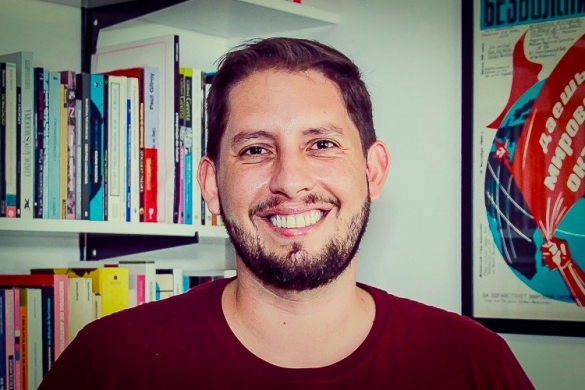Interview
Marcio Tavares: Brazil must change, but for now ‘let joy have its day’
The PT secretary: ‘The time has come to invest in life and not in policies of death: we must deal with poverty and hunger in Brazil and throughout the world.’

Marcio Tavares, secretary of culture of the Partido dos Trabalhadores, experienced the electoral campaign firsthand alongside Lula. After the narrow victory, he reflects on the need for deep cultural work to eradicate the system of hatred and fake news that has taken root in a country that now needs peace and conciliation.
Lula is celebrating with his people, preparing himself for his upcoming presidential duties, while his rival remains silent without making any statement: quite a contrast. [After a two-day silence, Bolsonaro has since declared he would begin the transition of government.]
During the campaign, Bolsonaro used public resources and the state apparatus to buy himself parliamentarians, mayors, for inappropriate initiatives aimed at increasing his support. His silence is a consequence of authoritarianism, of the lack of sense of institutions, of the failure to recognize defeat. We, on the other hand, must let joy have its day: our victory was achieved in a very unbalanced field of forces, and thanks to Lula and the unity of the opposition we have saved the country from the abyss. Lula has an extraordinary strength and vitality, a capacity for work, coordination, motivation, dialogue with various sectors of society that will give him the conditions needed to govern and stem the toxins of Bolsonarism as far as possible.
After Bolsonaro, it will be necessary to beat Bolsonarism: a cultural work that involves everyone.
Culture has a fundamental role in reconstituting an environment of cultural expression and artistic freedom, to recover a little of the brasilianidade that has been humiliated in recent years. We must take up the task of stimulating culture once again, with great force. A work that will include public policies and also other political segments to strengthen democratic values: through these policies, the importance of the clash between authoritarianism and democracy must be made obvious. This is the indispensable commitment.
In a recent interview with this newspaper, Lula said he wanted to rebuild Brazil: from promise to action, he will have to deal with a parliament where the right has a strong representation. Do you think a cultural revolution is possible in this context?
It is entirely possible to implement cultural policies even in this parliament. For example, we as the opposition and in the minority have managed to pass very important laws on culture, despite the regressive context of the Bolsonaro government: laws from the pandemic period, such as the Aldir Blanc II law, which allocates three million a year to culture for the next five years, and the Paulo Gustavo law, which recovers and redistributes the resources of the National Culture Fund that Bolsonaro wanted to allocate to the financial sector. Through dialogue with the more moderate sectors, starting from different political positions, we will find the conditions to enact significant changes: it is not easy, but it is possible.
Don’t you think that Bolsonarism, the subculture of hatred, violence, fake news, denial of truth, can infiltrate the democratic area as well?
I don’t think there is that risk. In the second round we enjoyed a strong reaction on social media, but it was different from that of lies and parallel reality characteristic of Bolsonarism. Perhaps by raising the tone, we managed to portray a figure in all his repugnant truth. Now we must move forward with legislation which, without affecting freedom of expression and the right of opinion, promotes a system of individual responsibility and platforms that can no longer think only about profit, but have the responsibility of public education. In this way, we will greatly diminish the impact of these underground networks of lies. We must re-discuss the regressive decrees that have dismantled culture, foment culture, not persecute it, and, as President Lula suggests, create culture committees to rebuild a national and international project.
“Less guns, more books,” said Lula in his speech: it seems like stating the obvious, but in a world of absurdity and the exaltation of weapons, this is becoming a necessity, not only for Brazil, but also for Europe and the US, where the increase in military spending is growing exponentially.
The time has come to invest in life and not in policies of death: we must deal with poverty and hunger in Brazil and throughout the world, improve living conditions, allow access to quality education and books to build an environment of harmony and respect. Books alone are not enough, they can end up sitting on the shelves, if they are not transformed into the pleasure of reading, into more infrastructure for education and critical thinking: by building a country of readers and informed people we will certainly be less susceptible to another “Bolsonaro” of the future. This is the challenge before us.
Originally published at https://ilmanifesto.it/ce-un-sistema-dellodio-da-estirpare-ma-ora-dobbiamo-liberare-la-gioia on 2022-11-01
